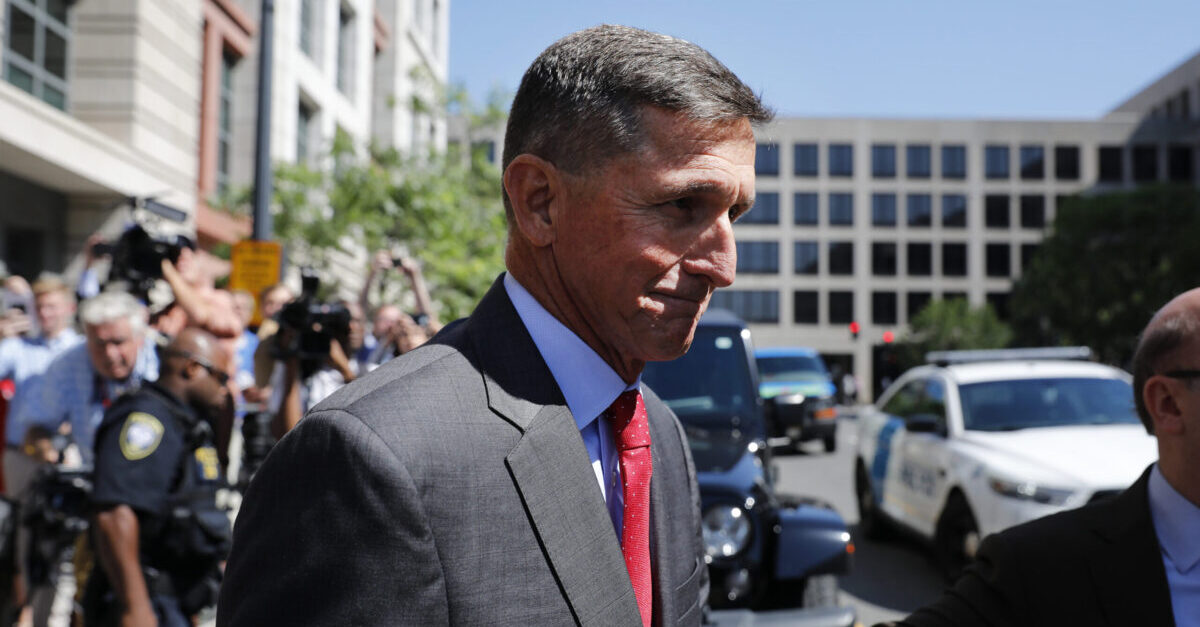
The U.S. Court of Appeals for the District of Columbia Circuit on Tuesday ordered oral arguments in the bumpy attempt by the U.S. Department of Justice to dismiss the prosecution against former National Security Advisor Michael Flynn.
Those arguments are set for Friday, June 12, 2020, at 9:30 a.m. before judges Karen L. Henderson (appointed by George H. W. Bush), Robert L. Wilkins (appointed by Barack Obama) and Neomi Rao (appointed by President Donald Trump).
Flynn’s legal team filed a petition for an emergency writ of mandamus to force the lower federal judge, Emmet Sullivan, to dismiss the case against Flynn. The Department of Justice sought to toss the case due to what it now believes were injustices over the way it was prosecuted — even though Flynn pleaded guilty and was poised for sentencing. Flynn concomitantly filed to withdraw his guilty plea. Sullivan appointed retired judge John Gleeson as amicus curiae to argue basically that Flynn’s case should move forward under the premise that it was under the control of the judicial branch, not the executive branch, after Flynn entered his plea.
Sullivan already submitted his response to the D.C. Circuit over why he took the legally bold move which may result in the case remaining alive. Sullivan, the trial judge, has also explored whether Flynn should be held in contempt for perjuring himself during the plea process.
Sullivan argued that the “factbound inquiry” he is attempting to conduct “involves well-established Article III powers, and the district court should be permitted to address it in the first instance”:
The contempt power is “settled law” that “is essential to the administration of justice.” Young v. U.S. ex rel. Vuitton et Fils S.A., 481 U.S. 787, 795 (1987). It springs from the court’s Article III responsibility to protect its es- sential functions, including preserving the integrity of courts and the truth- seeking process. See Int’l Union, United Mine Workers of Am. v. Bagwell, 512 U.S. 821, 831 (1994). Under this inherent power, “a court may issue orders, punish for contempt, vacate judgments obtained by fraud, conduct investiga- tions as necessary to exercise the power, bar persons from the courtroom, assess attorney’s fees, and dismiss actions.” United States v. Shaffer Equip. Co., 11 F.3d 450, 461 (4th Cir. 1993).
To be clear, a contempt finding or sanction against Mr. Flynn may prove unwarranted. If the representations in his January 2020 declaration are true, they present attenuating circumstances for his prior, contrary statements. But the nature and extent of Mr. Flynn’s reversals under oath—from whether he lied to the government in January and March 2017, to whether he was coerced into pleading guilty, misled by his former attorneys, or improperly dissuaded from withdrawing his guilty plea in 2018 when Judge Sullivan offered that option—raise questions that any judge should take seriously. They thus provide a basis for invoking the district court’s authority to “conduct investigations as necessary.”
DOJ argued in its brief that there is no Article III controversy here:
The Constitution vests in the Executive Branch the power to decide when—and when not—to prosecute potential crimes. Exercising that Article II power here, the Executive filed a motion to dismiss the indictment, and petitioner consented. Despite that exercise of prosecutorial discretion, and the lack of any remaining Article III controversy between the parties, the district court failed to grant the motion and bring the case to a close. It instead appointed an amicus curiae to argue against dismissal and to consider additional criminal charges.
This Court should issue a writ of mandamus compelling dismissal. Federal Rule of Criminal Procedure 48(a) provides that “[t]he government may, with leave of court, dismiss an indictment.” That language does not authorize a court to stand in the way of a dismissal the defendant does not oppose, and any other reading of the Rule would violate both Article II and Article III. Nor, under the circumstances of this case, may the district court assume the role of prosecutor and initiate criminal charges of its own. Instead of inviting further proceedings, the court should have granted the government’s motion to dismiss. And given the court’s infringement on the Executive’s performance of its constitutional duties, a writ of mandamus is appropriate, as this Court held in similar circumstances in United States v. Fokker Services B.V., 818 F.3d 733 (D.C. Cir. 2016.)
The D.C. Circuit panel further accepted amicus briefs filed by Watergate Prosecutors, Lawyers Defending American Democracy, Inc., John M. Reeves, the New York City Bar Association, former United States Attorney General Edwin Meese III, and the Conservative Legal Defense and Education Fund.
Further motions or amicus briefs must be submitted by Friday, June 5, the court ordered. Any reply by Flynn’s legal team is due by Wednesday, June 10.
In separate orders dated Tuesday, the court denied an amicus brief filed by Paul Andrew Mitchell.
The court has not decided whether to accept amicus arguments from GOP lawmakers in the U.S. House of Representatives or the U.S. Senate.
READ the court’s order below.
US v FLYNN – DC Circuit Orders Oral Arguments by Law&Crime on Scribd
[Image via Aaron P. Bernstein/Getty Images.]